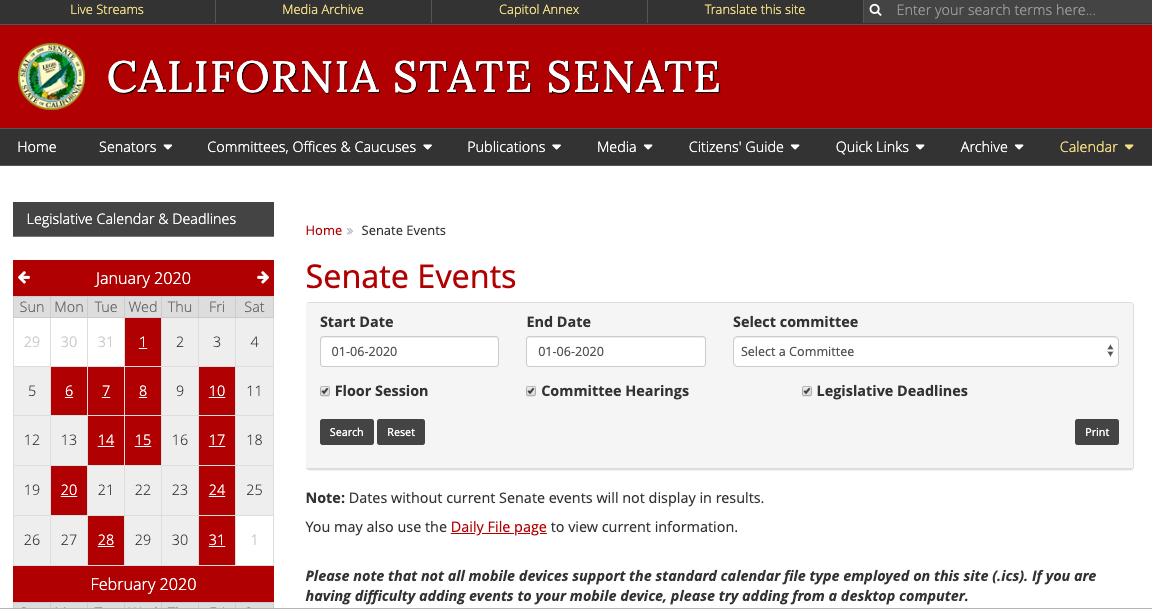
California State Capitol. (Photo: Kevin Sanders for California Globe)
Teaching People to Lobby
Effective lobbying requires an understanding of the process, the policy and the players
By Chris Micheli, December 22, 2019 9:45 am
By Ray LeBov and Chris Micheli
There are individuals intrigued by a career in legislative and regulatory advocacy, often called lobbying. In an effort to address people’s interest in learning about a lobbying career, they can take two half-day courses presented by Capitol Seminars, appropriately titled “Lobbying 101” and “Lobbying 201.”
According to the American League of Lobbyists, there is no specific degree or formal training to become a lobbyist, but lobbyists typically have a college degree while others have graduate or professional degrees. An understanding of how business and government interrelate is valuable to those interested in the profession. Many have a background in government service.
Lobbyists need to have strong oral and written communication skills. The ability to build relationships and persuade decision-makers is critical to a lobbyist’s success. Moreover, lobbyists must have the ability to analyze a client’s problem and determine the best course of action to address that problem.
Some of the additional qualities of a good lobbyist include strong interpersonal skills, effective oral and written advocacy skills, determination and hard work, a thorough knowledge of and understanding of the legislative and regulatory processes, honesty and integrity and the ability to operate in challenging environments. So, how do individuals interested in a career in lobbying obtain these skills?
Enrollment in one or both of the Capitol Seminars will provide more than just the basics of understanding the role of lobbyists. These courses provide attendees with the knowledge to participate in the lawmaking process at the state government level.
“Lobbying 101” is the introductory course and it covers the legislative process. While it is not all encompassing, the course thoroughly explores the step-by-step fundamentals of the legislative process in California and provides key insights into how the process actually works, beyond how it is often covered in a civics class. Those who take this first course receive comprehensive resource materials and they participate in interactive exercises to apply what they learn.
The purpose of the first course is to expose individuals to not only the basics of lobbying, but also to the best practices of effective legislative advocacy. The course covers the qualities of an effective legislative advocate; the rules of effective advocacy; and the language, culture and inter-workings of the California Legislature. Individuals are also exposed to the “do’s and don’ts” of testifying before legislative committees, how to find the right author for a bill, handling client relations, and understanding common mistakes made by lobbyists.
Attendees of this introductory course are presented with valuable information regarding FPPC registration and disclosure requirements, lobbying ethics, “how a bill becomes a law”, including insights regarding exceptions that illustrate how the process really works. In addition, there is extensive discussion regarding legislative rules, exceptions and waivers.
Other topics included in the introductory course include the following: legislative committees, their role, how they function, and how to work with them; the Legislative Counsel Bureau and its role in the process; glossaries of key legislative terms; common references to types and categories of bills and legislative measures; valuable legislative publications, documents and materials, including what they contain, which ones are the most important and how to use them on a regular basis.
“Lobbying 201” is the advanced course that is designed for graduates of the “Lobbying 101” course or for professionals with a significant amount of lobbying experience. Prior attendance at “Lobbying 101” is recommended, but it is not a prerequisite for taking the “Lobbying 201” course. The advanced course attempts to build upon the principles covered in the introductory class and this course provides an interactive overview of the evolving world of governmental advocacy.
Like the introductory course, the advanced course is presented by subject matter experts in certain critical, but often overlooked, practice areas including lobbying the Administration, budget advocacy, regulatory agency advocacy, and media strategies. The goal with this course is to take students beyond primary legislative advocacy in order to explore four other critical areas often unfamiliar even to experienced lobbyists. In this second course, guest speakers provide “real-world” perspectives on the players, processes and best practices in their respective areas of expertise.
In budget advocacy, it is just as important to track the progress of the budget and offer input as it is to participate in the legislative process for individual policy bills. The budget is a key policy statement and funding decisions are crucial for many areas of public policy with a state budget spending over $150 billion each fiscal year.
In lobbying the Administration, it is important to get a reading on how the Governor will view your sponsored bill, as well as those you are supporting or opposing, whether he is likely to sign any of these measures, and what you need to do to influence those decisions. Many lobbyists believe their work is done once a bill passes both houses of the Legislature. Of course, the Governor has the final say whether to sign or veto bills.
In regulatory agency advocacy, it is important to understand that winning or losing in the Legislature is not necessarily the end of the story. There is often another opportunity at the regulatory agency stage, either to defend a legislative victory or to obtain a more favorable result instead of an outright defeat. The laws and regulations regarding the state’s regulatory agency processes are as complex as the legislative process.
In media strategies, attendees learn to appreciate that media support for or against a bill can be critical, especially if the odds are against you. It can create momentum for legislative change or it can preclude legislation from going forward. Understanding the role of the media in the legislative process is critical.
Each course lasts roughly half a day and takes place at a convenient location in downtown Sacramento. Attendees who complete both courses are in a good position to parlay their new knowledge into work opportunities in the lobbying field. They will have sufficient knowledge to understand the legislative process and how to participate in it.
Fundamentally, effective lobbying requires an understanding of the process, the policy and the players in the legislative or regulatory process. A successful lobbyist possesses the experience and knowledge to connect all three. Subject matter expertise is also necessary. While attending these courses will not automatically make an individual a successful lobbyist, attendees are more likely to thrive because they will have been exposed to the key areas of emphasis for those interested in pursuing a career in this area.

Over the past ten years, 41-year Capitol veteran Ray LeBov and his Capitol Seminars have set more than 1,500 participants on the road to lobbying success. Chris Micheli is a Principal with the Sacramento governmental relations firm of Aprea & Micheli, Inc. and guest lectures for Capitol Seminars.
- Conservation Banks - February 22, 2026
- Mergers of Unincorporated Associations - February 21, 2026
- A Historic Look at Bill Introductions in the California Legislature - February 21, 2026




